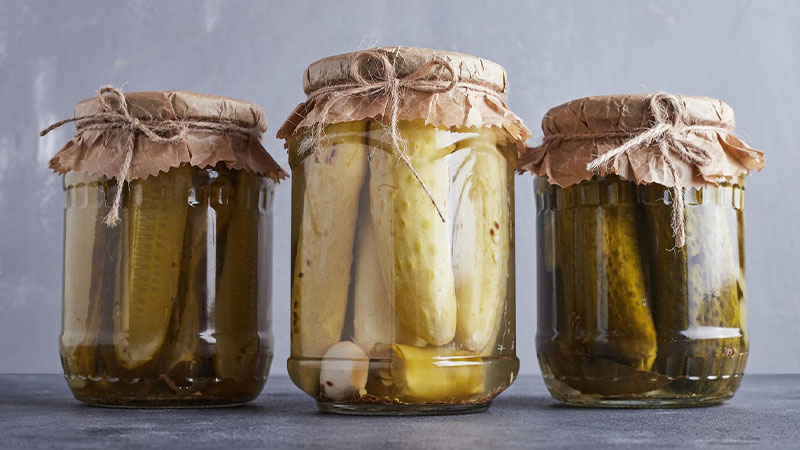
Pickles are more than just a tangy addition to your favorite sandwich or burger—they’re a surprising powerhouse of health benefits.
These crunchy delights, often low in calories and fat, pack a punch with their rich content of antioxidants, fiber, and essential vitamins like A and K.
While the type of pickle you choose plays a role in its health benefits, fermented varieties stand out by offering probiotics that support gut health.
Beyond their nutritional profile, pickles can help restore electrolyte balance and even alleviate muscle cramps. However, it’s essential to be mindful of their sodium content, especially in dill pickles.
As research continues to uncover the long-term effects of these briny treats, it’s clear that incorporating pickles into your diet can be a flavorful and healthful choice.
Dive into the world of pickles and discover how this humble snack can contribute to a balanced and nutritious lifestyle.
1. Packed with disease-fighting nutrients
Pickles contain vitamin K, which supports bone health and blood clotting. Added antioxidants like beta-carotene protect cells from damage.
Gut-friendly bacteria in fermented pickles boost digestion. Minerals such as calcium and magnesium help maintain strong bones and overall well-being.
Vitamin A enhances vision and boosts immune function. Fiber content in pickles aids digestion, providing a feeling of fullness.
Fermented varieties offer probiotics that support gut flora. Essential nutrients found in pickles contribute to disease prevention and play a role in maintaining health.
2. Supports a healthy gut
Beneficial microorganisms promote a healthy gut by maintaining diverse and stable microbiomes. They help with digestion and nutrient absorption. Fermented pickles can enhance gut health because they’re rich in probiotics.
These probiotics balance gut flora, reducing inflammation and supporting immunity. A diverse microbiome correlates with lower risks of chronic inflammation and weight gain.
Fermentation increases the bioavailability of antioxidants like flavonoids. These antioxidants protect gut cells from oxidative stress.
Fermented pickles offer the dual benefit of probiotics and antioxidants, contributing significantly to a robust digestive system.
3. Aids in weight management
Pickles are low in calories, making them suitable for weight-conscious individuals. The fiber content helps induce a feeling of fullness, reducing unnecessary snacking.
Fermentation increases probiotic levels, which support gut health and metabolism. A healthy gut microbiome is linked to reduced risks of chronic inflammation and weight gain.
When consumed in moderation, pickles can complement a balanced diet, assisting in maintaining a healthy weight.
However, consider the sodium content, which can affect water retention. Including pickles in meals offers flavor without significantly increasing calorie intake, promoting a weight-conscious lifestyle.
4. Helps regulate blood sugar levels
Pickles using vinegar-based brine can support stable blood glucose levels. Consuming vinegar at mealtime contributed to lower fasting blood glucose in a small 2013 study with 14 adults at risk of type 2 diabetes.
Stable glucose prevents intense hunger and is crucial for diabetes management. While more research is needed to establish vinegar’s extent of benefits, including pickles or vinegar-rich foods in meals could assist blood sugar control.
Like all fruits and vegetables, pickles contain antioxidants, counteracting free radicals’ impact and contributing to overall health.
5. Reduces muscle cramps
Pickles may offer relief from muscle cramps. Research from 2010 indicated that individuals who consumed pickle juice experienced quick cramp relief.
They induced muscle cramps electrically in well-hydrated men and observed rapid improvement after pickle juice intake. Interestingly, water alone didn’t provide similar benefits.
Although pickle juice can’t prevent sore muscles, it might alleviate cramps due to its acetic acid content.
A study found a tablespoon of dill or kosher pickle juice decreased cramp severity in 69% of participants. Including pickle juice in post-workout meals might enhance recovery.
6. Eases hangover symptoms
Pickles, especially the briny liquid they sit in, might help alleviate hangover symptoms. They’re rich in electrolytes like sodium, essential for hydration.
After a night of drinking, dehydration exacerbates hangovers. The vinegar in pickles can aid the liver in processing alcohol. A sip of pickle juice rehydrates and replenishes electrolytes faster than water alone.
Often, consuming pickle juice helps balance the body’s sodium levels. Hangover symptoms, like headaches and nausea, might reduce with this simple remedy. Analytical results from focused studies can firm up these observations further.
Pickles and Sodium: What to Consider
While pickles offer a range of health benefits, it’s essential to be mindful of their sodium content. High sodium intake can lead to increased water retention and elevated blood pressure, which may counteract some of the positive effects pickles provide.
For those watching their sodium levels, opting for low-sodium varieties or consuming pickles in moderation can help balance these concerns.
By doing so, individuals can enjoy the nutritional advantages of pickles without compromising their health goals. Incorporating pickles into a balanced diet allows for the enjoyment of their unique flavors and health benefits while maintaining overall well-being.
